Brian Day: Arthroscopic Trailblazer – 2023 Inductee Spotlight
November 21, 2023By Jason Beck
When news arrived earlier this Fall that the Beatles were releasing their final song on November 2nd, entitled ‘Now and Then,’ I was probably the only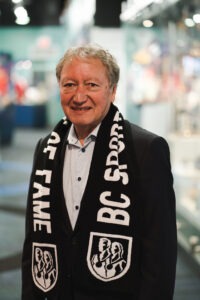 person who immediately thought of Dr. Brian Day, one of the BC Sports Hall of Fame’s 2023 Pioneer inductees. Brian is known as a pioneering world leader for developing and improving arthroscopic surgical techniques on athletes, a field he has been trailblazing in for over four decades now.
person who immediately thought of Dr. Brian Day, one of the BC Sports Hall of Fame’s 2023 Pioneer inductees. Brian is known as a pioneering world leader for developing and improving arthroscopic surgical techniques on athletes, a field he has been trailblazing in for over four decades now.
So where does the Beatles connection come in for Brian? It was maybe the most fascinating surprise that came out of the interviews conducted with the 2023 induction class. And for that we need to go back to the beginning of Brian’s story.
Brian was born and raised in Liverpool, specifically the Toxteth area otherwise known as ‘Liverpool 8.’ Ringo Starr later wrote a song and entitled his 2008 album Liverpool 8 because he was also from the same area. That’s the first Beatles connection but, Get Back, there’s more.
Like many parts of postwar England at that time, Liverpool was still rebuilding from the damage left behind from World War II. Much of the city was still covered in rubble and Brian remembered the top floor of his family’s house was bombed out. He attended the Liverpool Institute High School for Boys and two of Brian’s schoolmates about four-to-five years ahead of him were none other than Paul McCartney and George Harrison. Brian remembered even riding the bus to school with Paul and George sometimes.
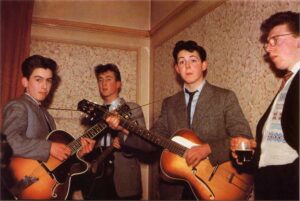 It was at the Liverpool Institute High School for Boys that a friend introduced Paul and George to John Lennon and a few years later after playing under various band names, the trio—joined by Ringo on drums—became known by the name which they will be forever famous for, The Beatles.
It was at the Liverpool Institute High School for Boys that a friend introduced Paul and George to John Lennon and a few years later after playing under various band names, the trio—joined by Ringo on drums—became known by the name which they will be forever famous for, The Beatles.
“Without my school, there would be no Beatles,” Brian said proudly during an interview at the BC Sports Hall of Fame earlier this year.
Brian regularly watched the group play at The Cavern Club in Liverpool before they later became known worldwide as the best-selling, most popular, and likely the most influential musical group of all time. Needless to say, he remains a huge Beatles fan to this day.
Putting music to the side for now, sport was always a major part of Brian’s life from a young age. Growing up boxing and soccer were his favourite sports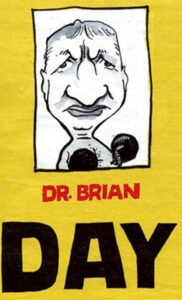 to play and he was a devoted Everton supporter. He remembered staying up late listening to the radio broadcast of Muhammad Ali (then Cassius Clay) defeating Sonny Liston for the world heavyweight title. He recalled another match between the great light heavyweight champion Archie Moore and Montreal’s Yvon Durelle where Moore was knocked down four times by the unheralded Durelle but came back to win the fight with an eleventh-round knockout. Even as a young boy, it was an important lesson, one that has guided him throughout his life.
to play and he was a devoted Everton supporter. He remembered staying up late listening to the radio broadcast of Muhammad Ali (then Cassius Clay) defeating Sonny Liston for the world heavyweight title. He recalled another match between the great light heavyweight champion Archie Moore and Montreal’s Yvon Durelle where Moore was knocked down four times by the unheralded Durelle but came back to win the fight with an eleventh-round knockout. Even as a young boy, it was an important lesson, one that has guided him throughout his life.
“To me the lesson there is if you get knocked down a few times, get up,” he explained. “It’s the same with soccer. We’ve all seen professional matches where teams get down 3-0 and then come back. Liverpool did it once, winning the European Cup from being three-nil down.”
Brian’s father was a pharmacist. Doctors would write prescriptions for patients and Brian’s father would fill them through his pharmacy.
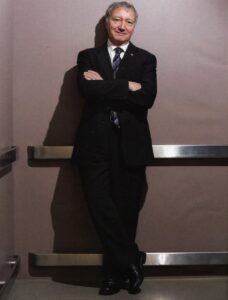 “One day when I was 14 or 15, my father said to me, ‘Do you want to write orders or take orders?’” Brian chuckled. “So that was it. Doctors used to come into my dad’s chemist shop and they’d say to me, ‘Oh, you have to do medicine.’ So I did.”
“One day when I was 14 or 15, my father said to me, ‘Do you want to write orders or take orders?’” Brian chuckled. “So that was it. Doctors used to come into my dad’s chemist shop and they’d say to me, ‘Oh, you have to do medicine.’ So I did.”
The direction of Brian’s life was essentially set by that one decision. After graduating from high school, Brian went straight to medical school at the University of Manchester. In England, medical school is a year longer than in Canada, but students don’t require an undergraduate degree beforehand to attend. It meant students like Brian graduated from English medical schools as full-fledged doctors by the age of 21 or 22, whereas in Canada it was usually 26 or 27.
While at Manchester University, Brian played on the university’s soccer team as a skilled and speedy winger.
“My kids describe me as being a former ‘Man U’ player, which sounds better,” he laughed.
It is true.”
Years later he would be operating on actual Manchester United stars in Vancouver. Speaking of which, how did Brian get to Vancouver? That’s another good story. If not for BC’s fantastic skiing, our province may never have become his home.
At the time of his graduation, academics in medicine were recommending that in order for young English doctors to progress, they should go work abroad somewhere, see what was being done elsewhere in the world, and then bring that knowledge back. Brian had heard of the great skiing in the Vancouver area and although he came to Canada in 1973 as an orthopedic trainee, make no mistake, the reason he chose Vancouver was skiing.
“I just saw pictures of the ski mountains and thought, ‘Well, that looks pretty good!’ I was addicted to skiing already because I’d learnt to ski in Austria and France. I was just hooked on it.”
With another job waiting at the University of Cambridge, it was only supposed to be a year away to work, learn, and ski. While here he joined the UBC residency program training to be an orthopedic surgeon.
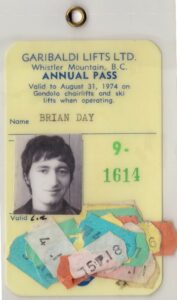 “I got to really like orthopedics because probably more than any other surgical specialty, we can take someone with a problem, fix it, and they go back as good as new, which is not very common in medicine. Back then it wasn’t certainly. So that’s why I like orthopedics. I didn’t really like orthopedics until coming here.”
“I got to really like orthopedics because probably more than any other surgical specialty, we can take someone with a problem, fix it, and they go back as good as new, which is not very common in medicine. Back then it wasn’t certainly. So that’s why I like orthopedics. I didn’t really like orthopedics until coming here.”
And yes, he crammed in as much skiing as humanly possible on the North Shore Mountains and up in Whistler.
“I still hold the record for the most days skied by a UBC orthopedic trainee in history. It’s a record approaching 50 years now. No one’s going to break it.”
For those counting, Brian skied a remarkable 65 days that winter. And lucky for us, rather than going back to the U.K. at the end of that year, he stayed in Vancouver and has lived here ever since.
After settling his medical practice in Vancouver, Brian discovered the new field of arthroscopy which involved putting a tiny scope into a joint as a diagnostic tool to view the area. The technique was pioneered in North America by Dr. Robert Jackson of Toronto, who became a friend of Brian’s and in 1994 was named one of Sports Illustrated’s forty most influential individuals in sport over the previous forty years. Brian took arthroscopic surgery to a new level when he began conducting surgery through the scope in the late 1970s, one of the first surgeons in Canada to perform this procedure. The arthroscope was mostly used at first for knee injuries, but Brian expanded its use to the shoulder, hip, elbow, ankle, and wrist.
“It moved to every joint,” he said.
With Brian’s background in sports , it seemed almost inevitable that he combine it with his interest in medicine. And as the field of sports medicine grew, he wasn’t alone. When UBC Hospital opened in 1981, all the orthopedic surgeons then were particularly interested in sports injuries, a roll call of sports med doctors familiar to many in BC: Brian, Dr. Pat McConkey, Dr. Ross Davidson, and a few years later a young Dr. Bill Regan, who now looks after the Canucks as the team’s head physician.
, it seemed almost inevitable that he combine it with his interest in medicine. And as the field of sports medicine grew, he wasn’t alone. When UBC Hospital opened in 1981, all the orthopedic surgeons then were particularly interested in sports injuries, a roll call of sports med doctors familiar to many in BC: Brian, Dr. Pat McConkey, Dr. Ross Davidson, and a few years later a young Dr. Bill Regan, who now looks after the Canucks as the team’s head physician.
Arthroscopic surgery was a gamechanger for athletes, a far less invasive procedure that cut recovery time from injuries in half and extended the careers of many athletes who in the past simply wouldn’t have recovered from injuries and older surgical techniques. Today the patient is often able to go home the same day as their surgery and then doesn’t occupy a hospital bed recovering.
Other changes Brian has witnessed over his career in arthroscopic surgery are just as dramatic. Early on, patients were often put in casts after the procedure for three months. That then evolved to having patients wearing braces and on crutches for an extended period. But as more surgeries were completed, Brian learned from his patients about how they could speed up the recovery time even further.
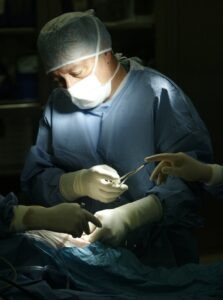
“I had some ACL [anterior cruciate ligament] surgeries on 15-16-year-old boys. You know what you’re like at age 15 or 16. I’d put them in a brace. I’d tell them to be on crutches and the mom would come back with them three weeks later saying, ‘Doctor, I’m so worried that he’s wrecked the whole thing because he hasn’t been using the brace or crutches, he’s been running and jumping around.’ I’d examine them and they’d be fine. I’d say, ‘You’re really, really lucky.’”
After about ten or more mothers had brought their sons back to him, he began to think maybe this wasn’t luck.
“So I started not using any braces or crutches, just letting them walk on it, letting them use it. And of course, they were teaching us something. They were teaching us you didn’t have to immobilize. One of the advantages of a minimally invasive surgery was you didn’t have to cut through the muscles or dismantle part of the joint to get at it. Another advantage was you didn’t need to immobilize them or put them in casts, splints, or braces. Now when I do an ACL, I like them to be on a stationary bike within a few days. So you learn from non-compliant patients.”
Brian even remembered one teenager who was back skateboarding within three weeks after surgery and another who was bungy jumping six weeks after surgery. Both were fine. Never has the mantra ‘movement is medicine’ been truer than in this field.
When Brian started out, he completed procedures on every joint. But as medicine has evolved over the last thirty years, every doctor began to sub-specialize. Now even within general surgery, some doctors will just do hand or prostate surgeries.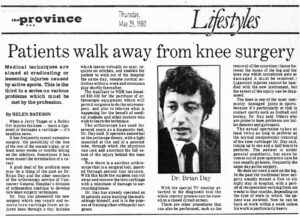
“Everyone’s getting narrower and narrower.”
Brian chose to focus on knees and shoulders.
“Those are the two joints that are most impacted in sports injuries,” he explained, while also acknowledging his preference for specializing. “You don’t want to be a jack of all trades. If you want to be a leader in your field, you have to focus on certain things. You get better at it the more you do.”
The principle applies not just to medicine. If you choose to limit your car repair service to just fixing BMW’s, you’re going to get a lot better at servicing BMW’s than someone who works on all makes. It just makes sense.
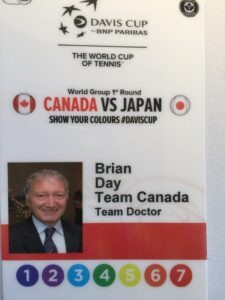 And as more years have gone by where Brian has focused mostly on knee and shoulder surgeries for athletes, it’s meant top athletes, professional teams, and other sports organizations from all over the world have sought him out because it’s become widely known he has the experience and is highly successful at getting injured athletes back out on the field in record time. It’s why he is widely regarded as one of the best in his field worldwide today.
And as more years have gone by where Brian has focused mostly on knee and shoulder surgeries for athletes, it’s meant top athletes, professional teams, and other sports organizations from all over the world have sought him out because it’s become widely known he has the experience and is highly successful at getting injured athletes back out on the field in record time. It’s why he is widely regarded as one of the best in his field worldwide today.
“It’s not necessarily that you’re better than someone else, but if you focus and narrow your field, you can become well known,” he summed up rather modestly.
It wasn’t long before some of the world’s top athletes came to him for procedures including those from the CFL, NHL, NBA, NASL, PGA, English Premier League, and Olympic medalists from Canada, US, Russia, and Australia. Obviously, he treated many athletes based close to home from the Canucks, Lions, and Whitecaps as well as serving as the physician for local events like the 1987 Federation Cup held at Hollyburn Country Club in West Vancouver or Whitecaps’ matches, including the late 1970s when Pelé and the New York Cosmos played here.
He chose to focus on treating individual athletes rather than working as a team doctor for a professional club because he felt that position could lead to conflicts. Some teams would rather have injured players forgo surgery in order that they return quicker for important games. Brian believed in doing what was right for the patient, which may not necessarily be what the team always wanted. Sometimes millions of dollars invested in players is at stake and careers could hang in the balance if reinjury were to occur.
But Brian did serve as the medical officer for many BC provincial and Canadian national teams including Canada’s Davis Cup and Federation Cup tennis teams and the Canadian Olympic team. He has also treated many celebrities ranging from Sylvester Stallone to Luciano Pavarotti, and many others who cannot be named.
Brian’s expertise became particularly respected and in demand amongst English Premier League clubs and players. When Brian operated on West Ham United midfielder Don Hutchison in Vancouver, it ended up on the front page of the Vancouver Sun. Hutchison is now a well-known soccer commentator in Britain. Chelsea FC sent their surgeon Andy Williams to Vancouver to learn Brian’s techniques. When Dutch defender Virgil van Dijk returned to play with Liverpool FC after nearly a year out with an ACL tear, the BBC commentator for a match in 2021 noted on-air: “He would have been back six months ago if Brian Day in Vancouver had operated on him.”
“It’s kind of funny to hear,” chuckled Brian.
 But whether he is operating on a celebrity, star athlete, or your average weekend warrior, he simply puts that out of his mind. They are all just another patient when in his care.
But whether he is operating on a celebrity, star athlete, or your average weekend warrior, he simply puts that out of his mind. They are all just another patient when in his care.
“You’re operating on a joint,” he summed up simply.
Once Brian almost operated on himself. After twenty years of not playing soccer, he tore his lateral meniscus when playing in a pick-up game between European tourists and Club Med kitchen staff while on holidays in the Dominican Republic. He needed arthroscopic surgery in his knee, his specialty, and considered doing it himself, but ultimately had a friend complete the procedure.
“I considered doing it under local anesthesia and submitting it to the Guinness Book of World Records as the first person to operate on themselves. But people told me not to do it in case it backfired and so I didn’t. But I think I could have. It would have been fun to do it. So, I’m a beneficiary of this surgery too.”
In the early 1980s, Brian taught the first ever university sponsored courses in training arthroscopic surgical techniques to other orthopedic surgeons. Those courses were held in Whistler, and the 1983 session represented the first-ever convention of any kind ever held in Whistler. It attracted visiting surgeons from all over the world. After that he became more involved in the academic research into arthroscopic surgery, serving as associate editor of the Journal of Arthroscopic Surgery from 1993-2001, and he travelled the world teaching it. Just one example was being invited by Real Madrid’s chief medical officer to lecture and teach in Madrid on arthroscopic surgery treatments for soccer injuries.
Those courses were held in Whistler, and the 1983 session represented the first-ever convention of any kind ever held in Whistler. It attracted visiting surgeons from all over the world. After that he became more involved in the academic research into arthroscopic surgery, serving as associate editor of the Journal of Arthroscopic Surgery from 1993-2001, and he travelled the world teaching it. Just one example was being invited by Real Madrid’s chief medical officer to lecture and teach in Madrid on arthroscopic surgery treatments for soccer injuries.
In 2004, Brian was awarded an honourary membership in the Cuban Orthopaedic Association after he was invited to Cuba by Fidel Castro’s son, Antonio, who is an orthopedic surgeon, to teach arthroscopic surgery to Cuban doctors. That led to a memorable experience with one of the most recognizable figures of the 20th century.
 “So I got to talk healthcare and other stuff with Fidel Castro sitting on the same sofa together from 11pm until 5am one night,” he recalled. “That was special. He’s a character. I mean, I enjoy talking to you but it’s not as amazing as talking to Fidel Castro.”
“So I got to talk healthcare and other stuff with Fidel Castro sitting on the same sofa together from 11pm until 5am one night,” he recalled. “That was special. He’s a character. I mean, I enjoy talking to you but it’s not as amazing as talking to Fidel Castro.”
That same year Brian became just the second Canadian to serve as president of the Arthroscopy Association of North America, the world’s leading academic society in the field of arthroscopic surgery and sports injuries. He considers this one of the highlights of his medical career.
“For the Americans to have acknowledged a Canadian it was kind of neat being a Canadian leading an American organization based in Chicago.”
In 2006, Brian was elected president of the Canadian Medical Association, the only orthopedic surgeon to serve in this role in an organization that was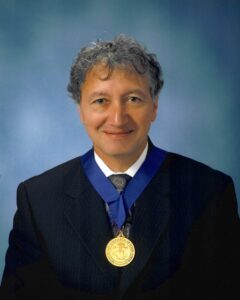 formed the same year as Canada’s Confederation in 1867. During his term he travelled to every province and territory and gave talks all over the world, including one back in his hometown in Liverpool where he and his wife dined privately with the city’s Lord Mayor, quite the full circle from his early days growing up in hardscrabble Liverpool 8.
formed the same year as Canada’s Confederation in 1867. During his term he travelled to every province and territory and gave talks all over the world, including one back in his hometown in Liverpool where he and his wife dined privately with the city’s Lord Mayor, quite the full circle from his early days growing up in hardscrabble Liverpool 8.
Among the notable honours Brian has received thus far, in 2012 he was ranked #38 in the Power50 list for influencers in Canadian sport by The Globe and Mail. In 2014, the BC Medical Association awarded him the Don Rix Award for Physician Leadership, an award for exemplary physician leadership determined by lifetime achievements that serve as an inspiration to the medical profession in British Columbia. It held special significance for Brian as Rix was a friend who got him involved in caring for the PGA golfers when the PGA Tour’s Greater Vancouver Open / Air Canada Championship was hosted by Surrey’s Northview Golf and Country Club from 1996-2002.
 But Brian unequivocally states his proudest accomplishment is his family. He has six children: two sons from his first marriage and three sons and one daughter from his current marriage approaching thirty years with Dr. Nina Bland, a former professional tennis player who represented Canada in the Federation Cup from 1979-81. Two of their younger boys work in the technology field with a very successful company founded by their older brothers. It’s a special family work connection. Their other son, also a former Canadian National tennis champion, is a lawyer in New York, and their daughter is currently completing law school.
But Brian unequivocally states his proudest accomplishment is his family. He has six children: two sons from his first marriage and three sons and one daughter from his current marriage approaching thirty years with Dr. Nina Bland, a former professional tennis player who represented Canada in the Federation Cup from 1979-81. Two of their younger boys work in the technology field with a very successful company founded by their older brothers. It’s a special family work connection. Their other son, also a former Canadian National tennis champion, is a lawyer in New York, and their daughter is currently completing law school.
“There is nothing like seeing your kids do well,” he said. “That you’ve got to be grateful for because so much can go wrong these days.”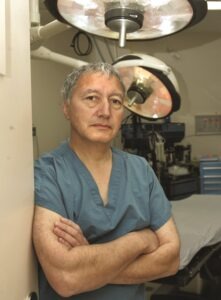
Medicine and arthroscopic surgery remains at the heart of Brian’s life to this day. Most Thursdays Brian can still be found conducting surgeries on patients at the Cambie Surgery Centre in Vancouver, the clinic he founded in 1995 and which is today one of the busiest private hospitals in Canada.
Even though increasingly more individuals from the sports medicine field have been honoured by sports halls of fame in recent years, Brian’s induction into the BC Sports Hall of Fame still took him by surprise, a very pleasant one.
“I mean I’m honoured and proud because sports has been a big part of my life, my career, and my family’s life. I’m just very proud and pleased, although pride is supposed to be a sin,” he laughed.
As part of the Class of 2023, Dr. Brian Day was formally inducted into the BC Sports Hall of Fame in the Pioneer category at the annual Induction Gala held June 1, 2023 at the Fairmont Hotel Vancouver.